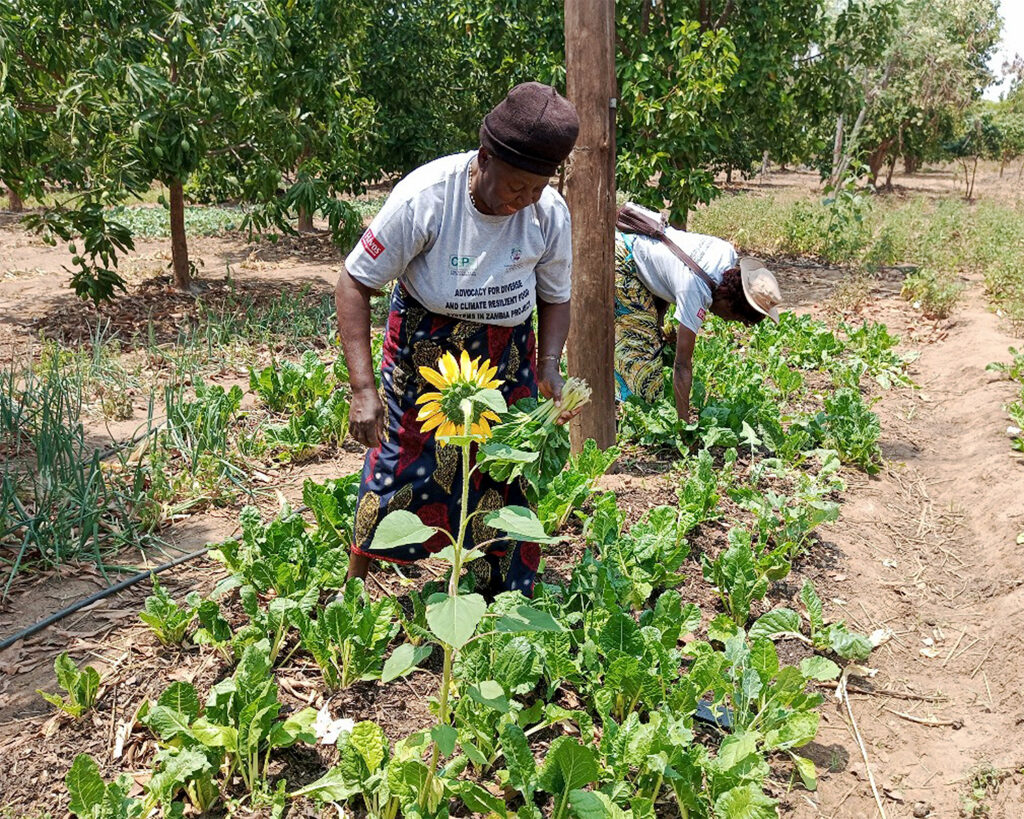World Food Day
World Food Day Reflection: Climate Change, Food Systems And A Case For Corporate Social Investment
In Zambia, the Hivos Voices for Just Climate Action program supports farmers who are harnessing simple water harvesting methods like furrows to grow tomatoes even in the dry season. Copyright: Hivos Southern Africa.
In commemoration of World Food Day, it is important to reflect on the interconnected relationship between climate change and food systems. The evidence is sobering:
- Without adaptation, climate variability could reduce Sub-Saharan Africa’s staple food – maize – by up to 40% by 2050[1].
- Heatwaves and erratic rainfall threaten rice and wheat, staples for over 1.5 billion people. For every 1°C rise in global temperature, wheat yields drop by 6% and rice yields by 3.2%.[2]
- Heat stress reduces dairy cow milk production by up to 25% in extreme conditions[3].
- Food systems account for roughly one-third (33%) of global greenhouse gas emissions[4].
- About 80% of global deforestation is linked to agriculture[5].
- Roughly 30% of all food produced is wasted, generating 8-10% of global emissions[6].
These figures underscore the urgent need to rethink how we produce and consume food. Without decisive action, the consequences will be severe and far-reaching. By 2030, up to 840 million people could be undernourished, with children facing rising rates of stunting, wasting, and obesity due to poor diets.
Why the private sector matters
Addressing these challenges requires concerted effort from all stakeholders, and the private sector is uniquely positioned to play a transformative role. Historically, the private sector has driven development through financing, innovation, and policy advocacy. However, investment in public goods such as climate and the environment has lagged behind, largely because environmental protection often yields broad societal benefits but limited direct financial returns.
Unless a clear business case – such as cost savings – exists, many private sector players hesitate to invest in climate adaptation. Indeed, a coalition of climate resilience groups reports that only 15% of private sector spending is expected to go toward adaptation over the next decade. This is insufficient. Greater private sector investment in climate adaptation and innovation is essential to building the momentum needed for meaningful climate resilience.
Shifting from CSR to CSI
To increase such investment, organizations are encouraged to move beyond traditional Corporate Social Responsibility (CSR) toward Corporate Social Investment (CSI). Unlike CSR, which can sometimes function as a compliance exercise or reputational checkbox, CSI is strategic, tangible and focused on long-term impact. It aligns with a company’s core business strategy and emphasizes investing in sustainable futures rather than merely avoiding harm.
CSI strengthens long-term business sustainability by improving community well-being, promoting social equity, and supporting national development goals. In short, it turns responsibility into opportunity.
Agroecology as a pathway
In this context, agroecology emerges as a critical area for CSI. Recognized as one of Sub-Saharan Africa’s leading strategies for climate resilience and adaptation, agroecology enhances resilience to droughts and floods, supports healthy ecosystems, and reduces dependence on synthetic fertilizers that drive greenhouse gas emissions. In doing so, it helps in building food systems that are sustainable, just and resilient.
Yet, agroecology remains underfunded, hindered by perceived risks. Challenges include:
- Lack of standardized metrics for return on investment,
- Unpredictable yields, and
- Limited infrastructure for processing, certification and distribution.
These barriers make it difficult for agroecological products to compete in markets dominated by industrial agriculture.
Nurturing the soil for tomorrow… Farmers in Zambia are applying bokashi, an organic compost, to enrich the land ahead of sowing, supported by Hivos Voices for Just Climate Action.
Unlocking potential through private sector support
Private sector support is therefore critical to overcoming these systemic challenges. Investment could take various forms, such as:
- Funding farmer training in sustainable practices,
- Supporting agroecological research and innovation hubs,
- Investing in local food systems and market access,
- Partnering with cooperatives to scale regenerative agriculture.
Hivos has been actively supporting such initiatives and recognizes the pressing need for increased investment in these areas to achieve sustainable, resilient, and equitable food systems.
On this World Food Day, let us reaffirm the importance of channeling Corporate Social Investment into agroecology. Not just as an ethical imperative, but as a smart strategy for building a food-secure and climate-resilient future!
This is written by Mangiza Chirwa-Chongo, the Voices for Just Climate Action Program Manager at https://hivos.org/southern-africa/





